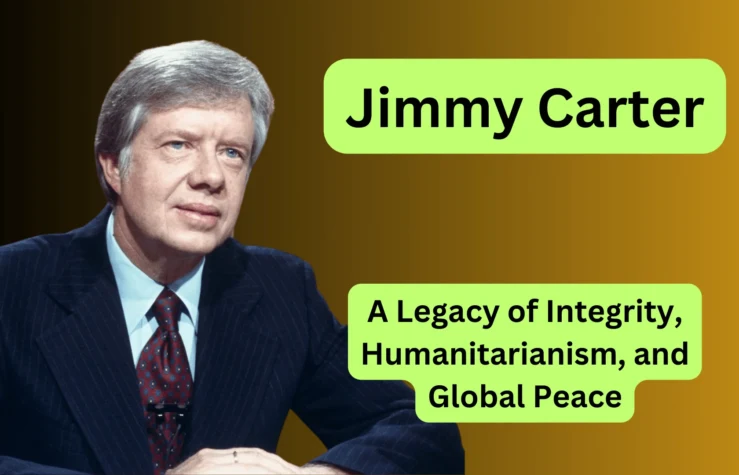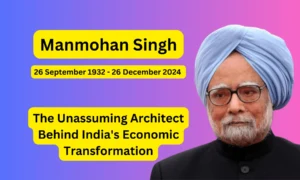Introduction
Jimmy Carter, the 39th President of the United States, holds a unique and significant place in American history, not only for his time in office from 1977 to 1981 but also for his enduring contributions as a humanitarian. Recently passing away at the age of 100, Carter’s life and legacy reflect a deep commitment to public service, human rights, and global peace.
Carter’s presidency is marked by notable achievements in foreign policy, particularly the Camp David Accords, which brokered peace between Israel and Egypt. This landmark agreement demonstrated his dedication to resolving long-standing conflicts through diplomacy rather than military action. In promoting democracy and social justice across the globe, his administration also highlighted human rights as a pillar of American foreign policy. Despite facing significant challenges, including an energy crisis and economic difficulties characterized by high inflation and unemployment, Carter’s approach sought to restore integrity and moral clarity to governance.
Beyond his political career, Carter’s dual legacy as a humanitarian is equally profound. After leaving the White House, he dedicated himself to various charitable endeavors, including his work with Habitat for Humanity and efforts to promote global health and democracy. His commitment to humanitarian causes earned him the Nobel Peace Prize in 2002, recognizing his tireless efforts to foster peace and improve living conditions for people around the world.
Jimmy Carter’s significance extends far beyond his presidency; he is remembered as a leader who prioritized moral values in both domestic and international affairs while continuing to advocate for human rights and humanitarian efforts throughout his life. His passing marks the end of an era but solidifies his legacy as a symbol of compassion and integrity in American politics.
Early Life and Education of Jimmy Carter
Birth and Family Background
Jimmy Carter, born James Earl Carter Jr. on October 1, 1924, in Plains, Georgia, emerged from humble beginnings that profoundly shaped his character and values. His parents, Earl and Lillian Carter, ran a small peanut plantation. Growing up in a rural environment without electricity or indoor plumbing, Carter’s early life was steeped in the realities of agricultural labor and the challenges faced by farming families during the Great Depression. He developed a strong work ethic, a profound respect for community, and perseverance as a result of this upbringing.
The Carter family’s farming roots were not just a means of livelihood; they were central to Jimmy’s upbringing and moral compass. His father was a successful businessman who also served in the Georgia state legislature, exposing young Jimmy to the world of politics and civic duty. His mother, Lillian, was a registered nurse known for her compassion and commitment to helping others, which inspired Jimmy’s lifelong dedication to humanitarian causes. These formative experiences in Plains instilled values of integrity, service, and empathy that would guide him throughout his life.
Education
Carter’s educational journey began in the local schools of Plains, where he demonstrated academic excellence. After graduating as valedictorian from Plains High School in 1941, he enrolled at Georgia Southwestern College before transferring to the Georgia Institute of Technology. However, his aspirations extended beyond academia; he had long harbored a dream of serving in the Navy.
In 1943, Carter’s ambition materialized when he received an appointment to the prestigious U.S. Naval Academy in Annapolis, Maryland. In 1946, he received his degree and received a commission as an officer in the US Navy. His early military service included training as a submariner, where he honed skills that would later prove invaluable in leadership and strategic thinking.

Carter’s time at the Naval Academy was not just about military training; it was also a period of personal growth. The discipline and camaraderie he experienced shaped his leadership style and reinforced his commitment to teamwork and service. After serving seven years in various capacities within the Navy, including submarine duty on the USS Seawolf, Carter returned to Georgia following his father’s death in 1953 to manage the family farm. This transition marked the beginning of his journey into public service and politics, where he would apply the lessons learned from both his upbringing and military experience to address the challenges facing his community and country.
Political Career
Entry into Politics
Jimmy Carter’s political journey began in earnest after the death of his father, which profoundly impacted his life and career trajectory. In 1953, following his return to Georgia from the Navy, he took over the family peanut farm, but the loss of his father ignited a desire for public service. Initially involved in local community affairs, Carter’s first political role came when he was elected to the local board of education in 1955. This experience laid the groundwork for his entry into state politics.
Carter ran a successful Democratic race for a Georgia State Senate seat in 1962. His victory was significant, as it marked his transition from agriculture to public service. During his tenure in the Senate, which lasted until 1967, Carter focused on various issues, including education and mental health reform. Although he faced challenges and setbacks—including a failed gubernatorial bid in 1966—these experiences honed his political acumen and deepened his commitment to serving the people of Georgia.
Governorship of Georgia
Carter’s political fortunes changed dramatically when he ran for governor in 1970. He won the election and was inaugurated as Georgia’s 76th governor on January 12, 1971. His governorship was characterized by a commitment to progressive reforms that aimed to modernize the state’s government and address social injustices.
One of Carter’s most notable achievements as governor was his bold stance on civil rights. In his inaugural address, he declared that “the time for racial discrimination is over,” a statement that shocked many in a state still grappling with segregationist policies. This declaration was not merely rhetorical; Carter actively worked to dismantle institutional racism within Georgia’s government and society. He opened state offices to African Americans and women, advocating for equal opportunities across various sectors.
Carter also implemented significant government restructuring during his time as governor. He introduced a comprehensive reorganization plan that consolidated numerous state agencies into larger units. This move aimed to improve efficiency and accountability within the state government. While some critics questioned whether these changes resulted in cost savings, they nonetheless positioned Carter as a leader committed to good governance and reform.
His governorship brought national attention to Georgia, showcasing it as a model for the “New South.” Carter’s progressive policies and emphasis on transparency resonated with many voters, setting the stage for his eventual presidential campaign. By the time he left office in 1975, he had established himself as a prominent figure in American politics, recognized for both his integrity and dedication to public service.
Presidential Tenure (1977-1981)
Election Campaign
Jimmy Carter’s ascent to the presidency was marked by his unique outsider status during a turbulent time in American politics. Announcing his candidacy in December 1974, Carter positioned himself as a reformer capable of restoring trust in government following the Watergate scandal and the resignation of President Richard Nixon. His campaign focused on themes of honesty, integrity, and a commitment to human rights, resonating with voters disillusioned by political corruption and seeking change.
His strategy capitalized on the growing desire for a leader untainted by Washington politics. He campaigned vigorously across the country, utilizing grassroots efforts and personal interactions to connect with voters. His slogan, “A Leader for a Change,” encapsulated his promise to bring a new approach to governance. Despite being relatively unknown at the national level, Carter’s determination and meticulous organization allowed him to secure victories in key primaries, ultimately leading to his nomination at the Democratic National Convention in July 1976. He selected Minnesota Senator Walter Mondale as his running mate, further solidifying his commitment to a balanced and experienced ticket.
Major Accomplishments
Carter’s presidency was characterized by significant achievements in both foreign and domestic policy, reflecting his commitment to diplomacy and social progress.
Foreign Policy
One of Carter’s most notable accomplishments was the negotiation of the Camp David Accords in 1978, which facilitated a peace treaty between Egypt and Israel. This landmark agreement not only ended decades of conflict between the two nations but also established Carter as a key player in Middle Eastern diplomacy. The accords were a testament to his belief in dialogue and compromise as essential tools for resolving international disputes.
Carter also prioritized relations with Latin America through the Panama Canal treaties, which aimed to transfer control of the canal from the United States to Panama by 1999. This move was controversial but demonstrated Carter’s commitment to respecting the sovereignty of other nations and fostering goodwill in the region.
Additionally, he played a crucial role in arms control negotiations with the Soviet Union, culminating in the SALT II treaty. Although this treaty faced challenges due to geopolitical tensions, it represented an important step toward reducing nuclear arms proliferation during the Cold War.
Carter’s administration also established diplomatic relations with China, marking a significant shift in U.S. foreign policy. By recognizing the People’s Republic of China, Carter opened up new avenues for trade and cultural exchange, fundamentally altering America’s approach to Asia.
Domestic Policy
Domestically, Carter’s presidency saw the creation of the Department of Education, which aimed to enhance educational opportunities for all Americans. This initiative reflected his belief that education is vital for personal development and societal progress.
Carter also championed significant environmental legislation, including measures to protect natural resources and promote energy conservation. His administration recognized the importance of addressing environmental issues amid growing concerns about pollution and resource depletion.
In response to an energy crisis marked by rising oil prices and fuel shortages, Carter implemented a comprehensive energy policy designed to reduce dependence on foreign oil. This policy included measures such as promoting renewable energy sources, encouraging conservation efforts, and establishing fuel efficiency standards for vehicles.
Despite facing economic challenges such as high inflation and unemployment rates during his presidency, Carter’s focus on human rights, environmental sustainability, and international diplomacy left an indelible mark on American politics. His tenure may have been fraught with difficulties, but it also showcased his unwavering commitment to integrity and public service—a legacy that continues to resonate today.
Post-Presidency Contributions
Humanitarian Work
After leaving the presidency in 1981, Jimmy Carter dedicated his life to humanitarian efforts, establishing a legacy that would redefine the role of former presidents. His commitment to improving global health and promoting human rights became the cornerstone of his post-presidential career. One of his most significant contributions was the founding of the Carter Center in 1982, a nonprofit organization aimed at alleviating human suffering and promoting democracy worldwide.
Through the Carter Center, Carter focused on various global health initiatives, including efforts to combat neglected tropical diseases. Notably, he championed the fight against Guinea worm disease, a debilitating parasitic infection that plagued millions in Africa. Under his leadership, the Carter Center implemented effective strategies for education and prevention, resulting in a dramatic reduction in cases—from approximately 3.5 million in 1986 to just a handful in recent years. This success not only showcased Carter’s commitment to public health but also highlighted his ability to mobilize resources and inspire action on critical global issues.
In addition to health initiatives, Carter was an ardent advocate for human rights and democracy. He traveled extensively to monitor elections and promote fair democratic practices in countries around the globe. His efforts included observing elections in nations with histories of electoral fraud, providing a voice for those seeking freedom and justice. Through these initiatives, Carter reinforced his belief that democracy is essential for peace and stability.
Literary Contributions
Carter’s post-presidential years were also marked by significant literary contributions. He authored numerous books that reflected on his experiences, beliefs, and the lessons learned throughout his life. His writings encompass a wide range of topics, from political memoirs detailing his time in office to reflections on faith, ethics, and global issues.
One of his notable works is “Keeping Faith: Memoirs of a President,” published in 1982, where he candidly discusses the challenges faced during his presidency and the principles that guided him. In “Palestine: Peace Not Apartheid,” released in 2006, Carter addressed complex Middle Eastern issues and advocated for a peaceful resolution to the Israeli-Palestinian conflict. This book sparked considerable debate but underscored his commitment to addressing difficult topics with honesty.
Carter’s literary endeavors extended beyond politics; he also ventured into writing poetry and children’s books, showcasing his versatility as an author. His ability to articulate profound thoughts on democracy, peace, and personal faith resonated with readers worldwide, further solidifying his status as a respected voice in contemporary discourse.
In summary, Jimmy Carter’s post-presidency contributions have left an indelible mark on both national and international landscapes. Through his humanitarian work with the Carter Center and his extensive literary contributions, he not only continued to serve as a moral compass for society but also inspired countless individuals to engage in public service and advocate for human rights. His legacy as a humanitarian leader remains influential, demonstrating that a former president can play a vital role in shaping a better world long after leaving office.
Legacy of Jimmy Carter
Impact on American Politics
Jimmy Carter’s legacy in American politics is complex and multifaceted, reflecting both the challenges he faced during his presidency and the profound influence he has had on subsequent generations of leaders. His tenure, marked by a commitment to integrity and ethical governance, set a standard for public service that resonates with many politicians today. Carter’s outsider status during the post-Watergate era allowed him to connect with voters seeking transparency and accountability in government. His emphasis on moral leadership and human rights shifted the focus of U.S. foreign policy, encouraging future leaders to prioritize ethical considerations alongside national interests.
Carter’s approach to governance emphasized the importance of service over politics, inspiring many future politicians to adopt similar values. His belief in the power of diplomacy and negotiation over military intervention has influenced how subsequent administrations navigate international relations. As a result, Carter is often viewed as a moral compass for politicians who aspire to lead with integrity and purpose.
Recognition
Carter’s humanitarian efforts have not gone unnoticed. He received the Nobel Peace Prize in 2002 in recognition of his lifetime efforts to advance democracy, human rights, and peace globally. This prestigious accolade underscored his significant contributions beyond his presidency, particularly through the work of the Carter Center. The Nobel Committee highlighted his efforts in conflict resolution, election monitoring, and disease eradication, which have had lasting impacts on global health and governance.
Carter’s recognition as a Nobel laureate solidified his status as a respected elder statesman whose influence extends far beyond his time in office. It serves as a testament to his unwavering dedication to humanitarian causes and his belief in the importance of moral leadership.
Conclusion
Reflecting on Jimmy Carter’s enduring legacy reveals a leader deeply committed to peace, human rights, and public service. His presidency may have faced considerable challenges, but it also laid the groundwork for a more ethical approach to governance that continues to inspire leaders today. Carter’s post-presidential work further exemplifies his dedication to making the world a better place, demonstrating that true leadership extends beyond political office.
In conclusion, Jimmy Carter’s life and career illustrate the profound impact one individual can have on society. His commitment to integrity, service, and humanitarianism has left an indelible mark on American politics and global affairs. As we remember him following his passing at age 100, it is clear that his contributions will continue to inspire future generations to pursue justice, equality, and peace in their own lives and communities.









